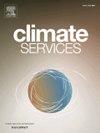Creating and testing an approach for upscaling climate services
IF 4
3区 环境科学与生态学
Q2 ENVIRONMENTAL SCIENCES
引用次数: 0
Abstract
Upscaling is the process of moving beyond pilots or prototypes to repeatable and/or transferable services that are accessible and useful to stakeholders and users. It may also refer to increasing the provision, reach, or impact of an existing service. Upscaling any service or product is a complex process, which – in the case of climate services – is exacerbated by serving an emerging market, and many projects taking place in academic settings with short term funding cycles. Climate service providers, their delivery partners and funders could benefit from increased reach and impact by explicitly considering how their services can scale and what the enablers and barriers to this may be. This could take the form of reviewing academic literature, applying structured frameworks, or learning from best practice examples.
Here, we describe the process of creating, testing, and refining an upscaling approach for climate services. The resulting approach is presented, alongside case studies that helped update it and provide evidence for its usefulness and useability. This detailed study of upscaling climate services sets the foundation for effective and sustainable provision of climate services beyond pilots and prototypes and further development of upscaling frameworks and tools to this end.
创建和测试一种提升气候服务的方法
升级是指从试点或原型转向可重复和/或可转让的服务的过程,这些服务对利益相关者和用户来说是可访问和有用的。它也可以指增加现有服务的供应、覆盖范围或影响。任何服务或产品的升级都是一个复杂的过程,就气候服务而言,服务于新兴市场会加剧这一过程,而且许多项目都是在学术背景下进行的,资金周期很短。气候服务提供者、他们的交付合作伙伴和资助者可以通过明确考虑他们的服务如何扩展以及可能的促成因素和障碍,从扩大的覆盖范围和影响中受益。这可以采取回顾学术文献、应用结构化框架或从最佳实践示例中学习的形式。在这里,我们描述了创建、测试和完善气候服务升级方法的过程。提出了最终的方法,以及帮助更新该方法并为其有用性和可用性提供证据的案例研究。这项关于扩大气候服务规模的详细研究为在试点和原型之外有效和可持续地提供气候服务以及为此进一步开发扩大气候服务的框架和工具奠定了基础。
本文章由计算机程序翻译,如有差异,请以英文原文为准。
求助全文
约1分钟内获得全文
求助全文
来源期刊

Climate Services
Multiple-
CiteScore
5.30
自引率
15.60%
发文量
62
期刊介绍:
The journal Climate Services publishes research with a focus on science-based and user-specific climate information underpinning climate services, ultimately to assist society to adapt to climate change. Climate Services brings science and practice closer together. The journal addresses both researchers in the field of climate service research, and stakeholders and practitioners interested in or already applying climate services. It serves as a means of communication, dialogue and exchange between researchers and stakeholders. Climate services pioneers novel research areas that directly refer to how climate information can be applied in methodologies and tools for adaptation to climate change. It publishes best practice examples, case studies as well as theories, methods and data analysis with a clear connection to climate services. The focus of the published work is often multi-disciplinary, case-specific, tailored to specific sectors and strongly application-oriented. To offer a suitable outlet for such studies, Climate Services journal introduced a new section in the research article type. The research article contains a classical scientific part as well as a section with easily understandable practical implications for policy makers and practitioners. The journal''s focus is on the use and usability of climate information for adaptation purposes underpinning climate services.
 求助内容:
求助内容: 应助结果提醒方式:
应助结果提醒方式:


